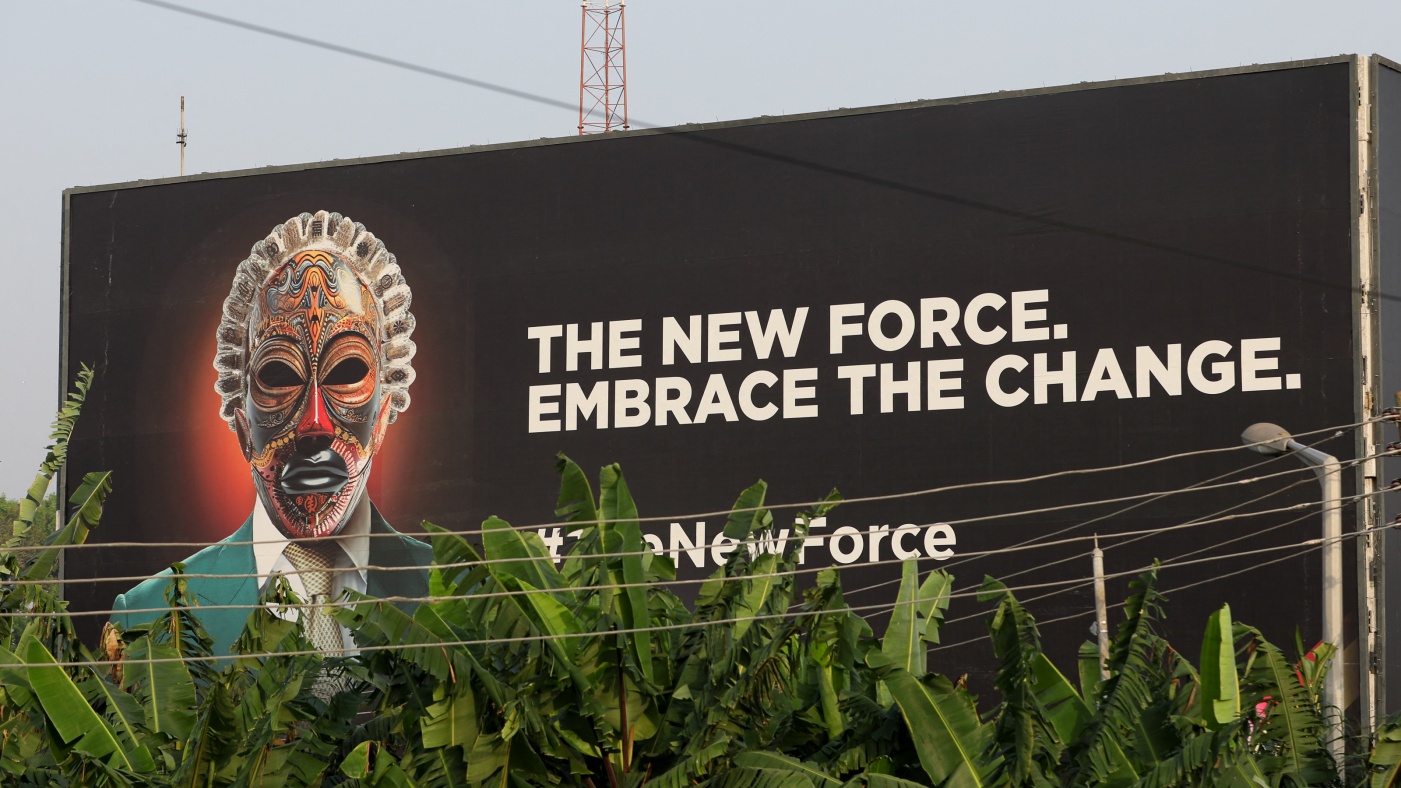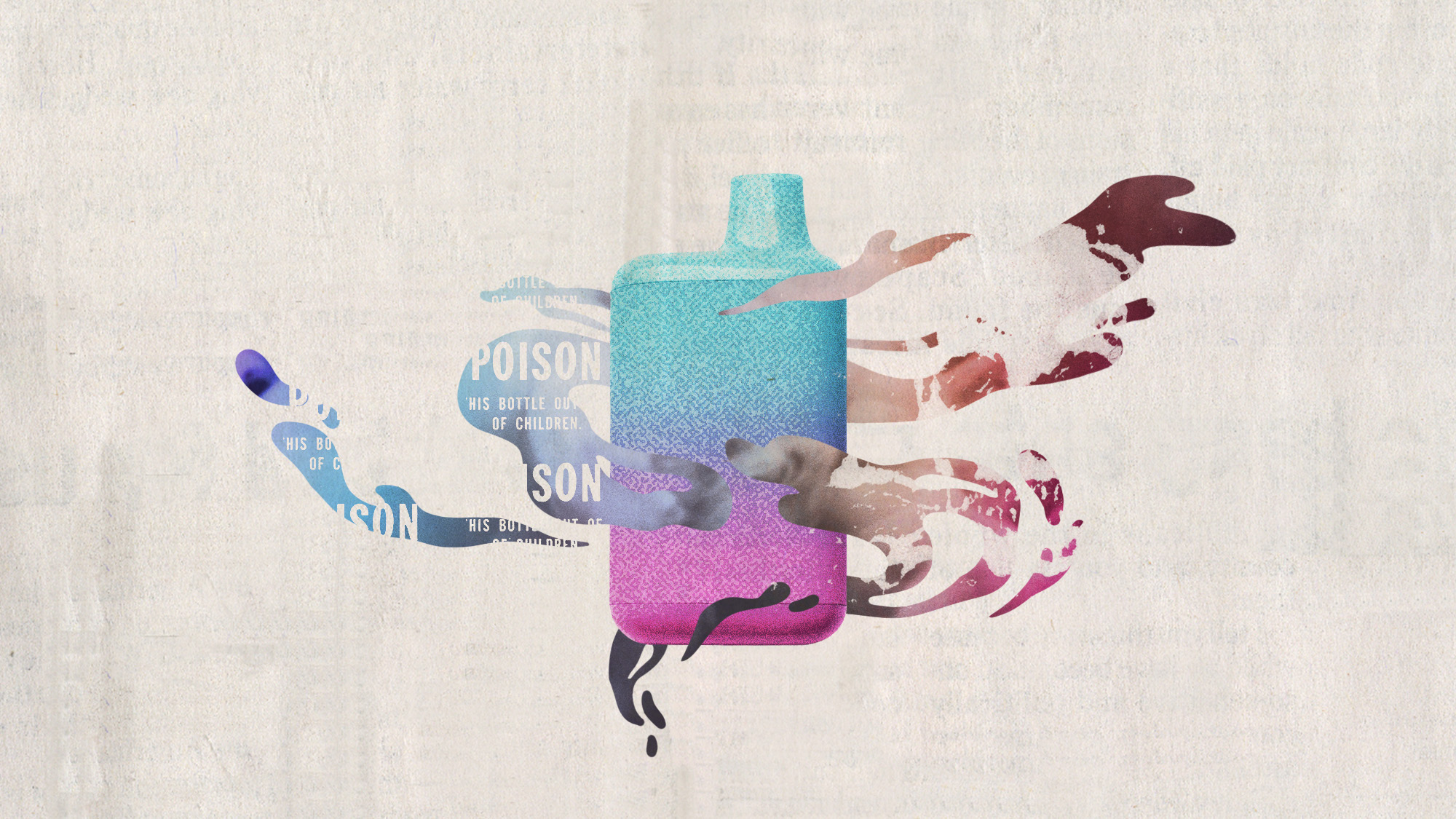Ghana's masked presidential candidate adds sense of mystery to election
Little is known about the masked figure or their campaign, but there has been plenty of online speculation

A free daily email with the biggest news stories of the day – and the best features from TheWeek.com
You are now subscribed
Your newsletter sign-up was successful
Billboards featuring a mysterious masked figure have appeared in cities across Ghana in the run-up to the country's 2024 presidential election.
The "enigmatic" posters feature an "unidentified figure cloaked in a mask" alongside the slogan #TheNewForce, said GhanaWeb. They started to appear last month in Accra, Kumasi, Cape Coast, Takoradi, Ho and Tamale, according to Semafor.
With the presidential election a year away, the emergence of a new, anonymous contender has added an "air of mystery and curiosity to the already charged political atmosphere", GhanaWeb added.
The Week
Escape your echo chamber. Get the facts behind the news, plus analysis from multiple perspectives.

Sign up for The Week's Free Newsletters
From our morning news briefing to a weekly Good News Newsletter, get the best of The Week delivered directly to your inbox.
From our morning news briefing to a weekly Good News Newsletter, get the best of The Week delivered directly to your inbox.
'The New Force' or a familiar face?
While some view the figure as a "symbol of hope" and a "fresh contender distinct from the traditional players" of Ghana's two main political parties, the New Patriotic Party (NPP) and the National Democratic Congress (NDC), others have expressed scepticism over the stunt.
"It will be difficult to vote for someone whose face I cannot see," said one member of the public speaking to GhanaWeb.
Almost nothing is known for certain about the candidate and "The New Force" beyond its billboard messaging, which promises "leadership for a new generation".
In late November, the campaign issued a statement promising that their masked candidate would be revealed in "the shortest possible time" alongside its "policy objectives and goals". But so far, few details have emerged.
A free daily email with the biggest news stories of the day – and the best features from TheWeek.com
Online, and in the Ghanaian media, there is speculation that the masked figure may be businessman and socialite Nana Kwame Bediako, also known as "Cheddar".
"It is obvious it is Cheddar, the stature of the individual looks exactly like him," said graphic designer Felix Frimpong from Accra, speaking to Semafor.
Bright Simons, research lead at the Imani Centre for Policy in Accra, wrote on X that he believed Bediako was the "bankroller" of the movement, calling him a "maverick businessman" with "a thing for tamed, neutered, tigers". This is a reference to a recent BBC story, which said that Bediako had been ordered to remove two imported pet tigers living at his home in Accra.
The beginning of a third political force?
Power in Ghana has alternated between the two main political parties, the NPP and the NDC, since the country embraced multi-party democracy in 1992.
But critics say their governance "has been marred by nepotism, corruption, and financial mismanagement", said Semafor.
The New Force's supporters hope the campaign could herald the emergence of a new, third political force in the country. But it is unlikely the campaign will be able to win enough support in the next year to take on Ghana's ruling parties.
"A third force will be difficult to emerge at this time to disrupt the NDC or NPP within the next 12 months," said political analyst Professor Samuel Adu-Gyamfi, speaking to the news site.
And the campaign will also have to compete with Movement of Change, a political group founded by Alan Kyerematen, a former trade minister who left the ruling NPP.
Few other details have emerged about the campaign, save for short videos posted to The New Force's X account, featuring the campaign's apparent spokesperson, 30-year-old Belgian national Shalimar Abbiusi.
In one video, Abbiusi says that the campaign's agenda is that "of the people of Ghana" to "look into our current state" and figure out "how to attain the aspirations of the people".
But the campaign is facing further controversy after Abbiusi's arrest earlier this month on charges of acquiring a student permit in Ghana through false declarations, according to GhanaWeb.
Prosecutors subsequently dropped the charges against her, but she has since been re-arrested by the Ghana Immigration Services, reported the news site.
Sorcha Bradley is a writer at The Week and a regular on “The Week Unwrapped” podcast. She worked at The Week magazine for a year and a half before taking up her current role with the digital team, where she mostly covers UK current affairs and politics. Before joining The Week, Sorcha worked at slow-news start-up Tortoise Media. She has also written for Sky News, The Sunday Times, the London Evening Standard and Grazia magazine, among other publications. She has a master’s in newspaper journalism from City, University of London, where she specialised in political journalism.
-
 Political cartoons for February 12
Political cartoons for February 12Cartoons Thursday's political cartoons include a Pam Bondi performance, Ghislaine Maxwell on tour, and ICE detention facilities
-
 Arcadia: Tom Stoppard’s ‘masterpiece’ makes a ‘triumphant’ return
Arcadia: Tom Stoppard’s ‘masterpiece’ makes a ‘triumphant’ returnThe Week Recommends Carrie Cracknell’s revival at the Old Vic ‘grips like a thriller’
-
 My Father’s Shadow: a ‘magically nimble’ film
My Father’s Shadow: a ‘magically nimble’ filmThe Week Recommends Akinola Davies Jr’s touching and ‘tender’ tale of two brothers in 1990s Nigeria
-
 Epstein files topple law CEO, roil UK government
Epstein files topple law CEO, roil UK governmentSpeed Read Peter Mandelson, Britain’s former ambassador to the US, is caught up in the scandal
-
 Mexico’s vape ban has led to a cartel-controlled black market
Mexico’s vape ban has led to a cartel-controlled black marketUnder the Radar Cartels have expanded their power over the sale of illicit tobacco
-
 Iran and US prepare to meet after skirmishes
Iran and US prepare to meet after skirmishesSpeed Read The incident comes amid heightened tensions in the Middle East
-
 Israel retrieves final hostage’s body from Gaza
Israel retrieves final hostage’s body from GazaSpeed Read The 24-year-old police officer was killed during the initial Hamas attack
-
 China’s Xi targets top general in growing purge
China’s Xi targets top general in growing purgeSpeed Read Zhang Youxia is being investigated over ‘grave violations’ of the law
-
 Panama and Canada are negotiating over a crucial copper mine
Panama and Canada are negotiating over a crucial copper mineIn the Spotlight Panama is set to make a final decision on the mine this summer
-
 Why Greenland’s natural resources are nearly impossible to mine
Why Greenland’s natural resources are nearly impossible to mineThe Explainer The country’s natural landscape makes the task extremely difficult
-
 Iran cuts internet as protests escalate
Iran cuts internet as protests escalateSpeed Reada Government buildings across the country have been set on fire